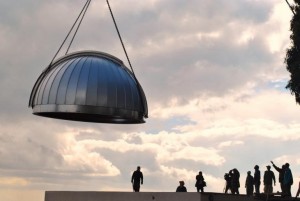Ethiopia inches one step closer to a formal space program
 With the construction of the observatory on the Entoto mountains underway, Ethiopia inches closer to getting its space program off the ground.
With the construction of the observatory on the Entoto mountains underway, Ethiopia inches closer to getting its space program off the ground.
The Ethiopian Space Science Society is in charge of the construction of the observatory, which will feature two massive optical telescopes – a silver dome that will house one of the two telescopes was installed on Thursday. A towering crane elevated the dome from the ground, while workers secured it upon a small concrete building. The telescopes are expected to be delivered and begin operation in the next few weeks. Once the telescopes are installed and equipped with telecommunications technology, they can be controlled from afar.
Tulu Besha, the facility’s head of earth observation explained that the Entoto telescopes will enable students and researchers observe astronomical objects in space. He stated, “The telescopes’ application nowadays is very wide. Once we establish this facility and create post-graduate programs in space sciences, our students will be able to go anywhere and participate in international satellite communication missions. They will get good skills and can work to benefit other types of technology too, like telecommunications.”
Laboratory Director and one of the founding members of ESSS, Solomon Belay, said the main purpose of the telescopes will be to set the stage for astronomical education in Ethiopia and nurture post-graduate students for opportunities to study abroad.
“ESSS began when I was a graduate student; a group of us started a stargazing program using small telescopes on the mountain,” he said. “Ethiopia’s climate conditions are perfect for astronomy, and that is a good base for the development of other sciences and technologies. So we wanted to encourage people here to work in space sciences.”
Funding for this project has been difficult as the telescopes and their accessories alone cost $3.4 million. The equipment is supplied by a German company called Astelco Systems. The Ethiopian government provides some necessary infrastructure such as roads, electricity and internet connectivity and also indirectly funds to the project through the 32 public universities that will run the observatory. A vast majority of the funding, however, comes from individual members of the ESSS and board member Sheikh Mohammed al Amoudi.
Solomon has hopes that the profession will grow in the future and the institution will be able to launch satellites or even people into space. He also noted that their first priority will be to help Ethiopian development by using a scientific approach as well as encourage knowledge and technology transfers. For this reason, researchers and students who use the telescopes see it as a wise investment.
Source: International Business Times